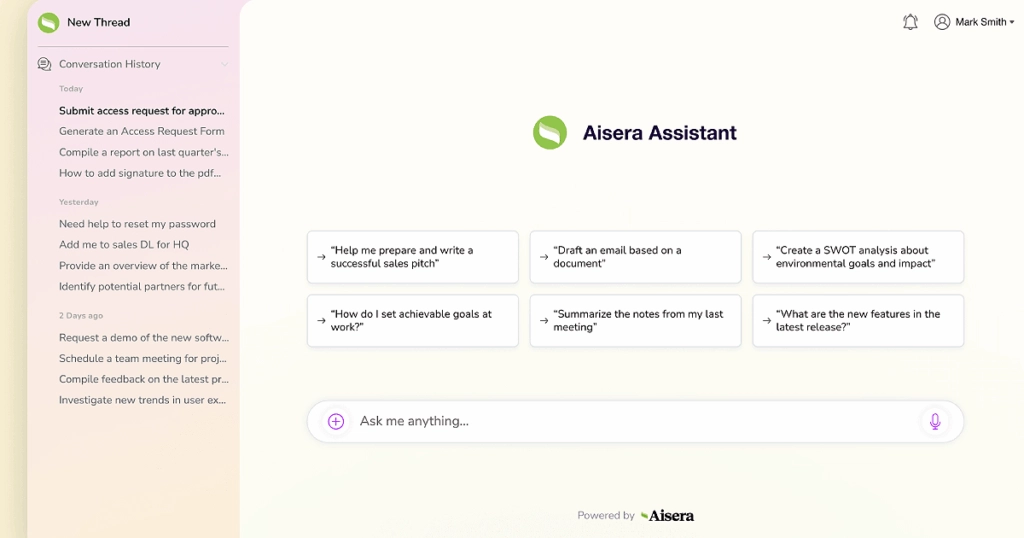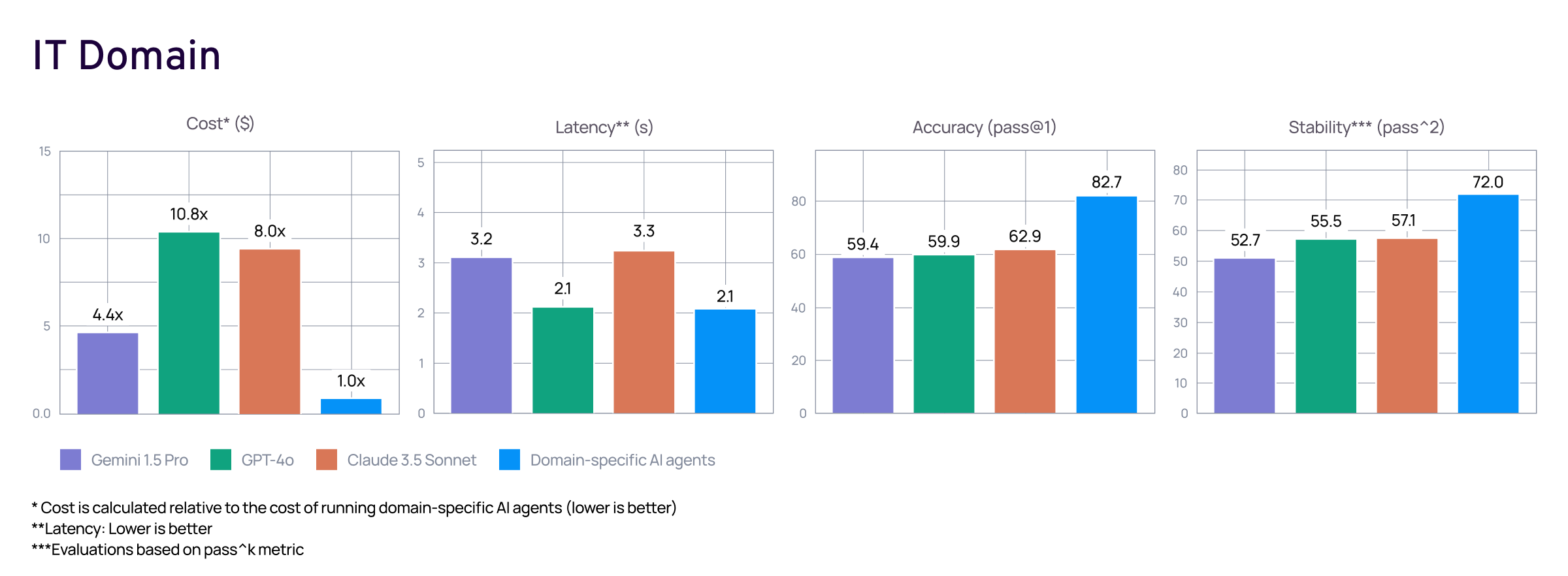Why AI Assistants Are a Game-Changer for Modern Businesses
While over 78% of organizations report that they’re using AI in 2025, 60% expect to make less than half of their investment back. Implementing AI doesn’t automatically lead to value creation. Equally important is choosing the right models, top-tier agents, and the best AI assistants for your specific business goals.
AI assistants, specifically, are changing the game for modern businesses in one key way. They support users directly, responding to questions, generating content, and improving individual and team productivity through conversation. As the market continues to grow, reaching a projected $21 billion by 2030, its capabilities will only become more complex.
Capturing value from AI assistants starts with understanding the best tool for your business needs. This means before you buy a tool, you need to evaluate its domain-specific capabilities, integrations, and more. This blog has reviewed leading AI assistants to help you make an informed choice.
Key Takeaways
- AI assistants are transforming business operations, driving productivity, efficiency, and cost savings by automating routine tasks and freeing up employees’ time and mental space for high-value work
- Future-ready organizations choose specialized AI partners like Aisera to stay competitive: reducing costs, improving experiences, and unlocking measurable business outcomes.

The Key Benefits of Adopting an AI Assistant
Adopting an AI assistant is fundamentally about empowering businesses to achieve more with less. When implemented strategically and as a tool to augment human capabilities, AI assistants can unlock numerous benefits for customers, clients, employees, and more.
Additionally, AI assistants can enhance customer interactions by providing timely, personalized responses and actionable insights, leading to improved sales strategies and overall customer satisfaction.
Increased Productivity and Efficiency
AI assistants increase productivity and efficiency by automating repetitive, low-value tasks: data entry, scheduling, and information retrieval, etc. They also help users manage their to do list and calendar by automatically adding, rescheduling, and optimizing tasks based on calendar events and availability, streamlining daily workflows. As a result, employees are able to concentrate on higher-impact, strategic work. This, in turn, creates a more agile, innovative business that can quickly adapt to change and maintain its competitive edge.
Enhanced Customer and Employee Experience
AI assistants provide instant, personalized 24/7 support for both customers and employees, eliminating bottlenecks, reducing wait times, and providing an enhanced experience. They can talk naturally with users, engaging in ongoing conversations and smoothly handling complex or sensitive topics. For employees, this means quick answers to HR or IT questions, faster onboarding, and self-service for routine needs. For customers, consistent, always-available service enhances loyalty, speeds up resolution times, and enables seamless multi-language and omnichannel engagement.
Cost Reduction
Implementing AI assistants can also lead to significant cost savings. By automating common queries and support tasks, enterprises can reduce the need for large IT help desks and customer service teams. This enables you to scale operations without a proportional increase in headcount. However, it’s important to note that some advanced AI assistant features may incur an additional cost, which organizations should consider when budgeting.
Data-Driven Insights
By continuously analyzing internal communications, support tickets, and business data, AI assistants can also track project progress, deadlines, and team workloads, surfacing trends, flagging bottlenecks, and delivering actionable recommendations for improvement. This empowers business leaders to make confident, real-time decisions based on metrics and predictive analytics instead of gut feelings, while generating automatic reports that uncover hidden opportunities or risks.
Which Features Should You Look for in an AI Assistant?
The right AI assistant for your enterprise will depend a good deal on your specific business needs and the value you want to unlock. It’s also important to choose solutions that regularly introduce new features, ensuring your business stays ahead as needs and technologies evolve. That said, every tool should have the following baseline capabilities.
Integration with Existing Systems
One of the most critical factors in evaluating AI assistants is the ability to integrate with your current tech stack. Assistants that natively connect to CRM (Customer Relationship Management), ERP (Enterprise Resource Planning), and IT service management platforms will be able to share and act on data across departments.
Seamless integration with digital calendars is also essential, as it enables automated scheduling, real-time adjustments, and visualization of project timelines to boost team productivity and collaboration. This streamlines workflows, improves information flow, and ensures the assistant becomes a value multiplier vs. a standalone widget.
AI Specialization and Domain Expertise
Generic AI models can only go so far in complex or regulated environments. That’s why companies are increasingly relying on domain-specific models as the foundation for their AI assistants, agents, and systems. In fields like healthcare, finance, or legal, specialization leads to fewer errors, higher user trust, and the ability to accurately process technical terms in specialized fields.
Security and Compliance
When dealing with sensitive or regulated data, security is mandatory. The best AI assistants offer enterprise-grade encryption, role-based access controls, detailed audit trails, and compliance with global standards like GDPR, HIPAA, and SOC 2. These capabilities not only protect your data but also ensure your business remains compliant, minimizing legal exposure and safeguarding your brand’s reputation.
Customization & Scalability
As businesses grow and evolve, so do their requirements. AI assistants need to be able to keep pace through configurable workflows, modular capabilities, and adjustable interfaces that reflect company culture or specific processes. With these features, users can also create and deploy their own AI agents for tailored automation and research, enabling personalized solutions that adapt to unique business needs.
Assistants with scalable infrastructure and customization options also offer long-term value, which helps organizations avoid the expense and disruption of switching platforms down the line, when it becomes very complex and expensive to do so.
Ease of Deployment and Management
AI assistants aren’t fully autonomous. Which means that even the most powerful AI assistant will fail if it’s difficult to implement. Look for solutions with intuitive dashboards, guided onboarding, and a user-friendly, low-code or no-code deployment experience. This will allow both IT and business users to set up, manage, and refine their assistant with minimal technical support.
Top AI Assistants: A Head-to-Head Comparison
Choosing the best AI assistant depends on your business needs, whether that’s enterprise automation, everyday productivity, or general-purpose support. Today’s top AI assistants have advanced automation, seamless integrations, and natural language capabilities to boost efficiency and deliver results. Below, we review the top options, Aisera, Microsoft AI Copilot, ChatGPT, Gemini, and Claude, highlighting their features, strengths, and limitations to help you find the right one for your company.
1. Aisera Assistant
Best for Enterprise-Grade Automation & Service Management
Aisera is one of the agentic AI leaders and a frontier in agentic AI systems. Aisera Assistant is for organizations seeking enterprise-grade automation, especially for IT, HR, Finance, and Customer Service. In addition to serving these domains, Aisera provides comprehensive services that include advanced user interaction, response generation, and secure, scalable infrastructure to support these functions.
Aisera’s agentic AI capabilities, domain-specific tuning, and robust integrations make it an ideal choice for complex environments where both speed and accuracy are critical.
Features
- Pre‑built, domain‑specific AI agents that you can deploy in days
- Advanced automation: automate tasks across departments with hyperflows, Autobrief, GenIQ, intentless understanding, contextual disambiguation, and multi‑modality
- Seamless integration with enterprise systems (e.g., ServiceNow, Workday, Salesforce, Microsoft 365) and 100+ backend apps to orchestrate workflows end-to-end.
- Multi‑agent collaboration through a unified “System of AI Agents”, comprising universal, domain, and task agents to coordinate complex, cross‑departmental workflows.
Pros
- Delivers true enterprise automation with deep domain capabilities and global scalability
- Excels in integration with leading enterprise platforms
- Demonstrates measurable impact: 81% auto‑resolution, more than 55% productivity gains, and significant cost reduction
Cons
- The user interface is continually evolving to enhance usability and deliver a more intuitive experience.
- Pricing is custom quote‑based, so each deal is tailored to specific customer needs
Aisera Pricing
- Available via quote-based pricing only. Enterprise contracts typically include usage metrics, premium support tiers, and setup fees.

2. Microsoft Copilot
Best for Integrated Productivity Across Microsoft 365 Ecosystem
Microsoft Copilot leverages advanced AI capabilities embedded directly within Microsoft 365 applications like Word, Excel, PowerPoint, and Outlook, delivering contextual assistance that enhances productivity across everyday tasks. It helps users draft documents, analyze data, create presentations, and manage communications through natural language prompts and AI-driven insights
Features
- Native integration within Microsoft 365 apps for seamless workflow assistance
- AI-powered content generation, data summarization, and visualization
- Real-time collaboration support with intelligent suggestions across Teams and Outlook
- Integration with Microsoft Teams for meeting support, recording, transcribing, and collaboration
- Enterprise-grade security and compliance built on Microsoft’s trusted cloud infrastructure
Pros
- Deep integration with the widely used Microsoft productivity suite
- Speeds up routine work by automating document creation and data analysis
- Leverages Microsoft’s robust security, compliance, and identity management
- Enhances collaboration with context-aware assistance in communication platforms
Cons
- Primarily focused on Microsoft ecosystem users, limiting cross-platform flexibility
- Advanced AI features require specific Microsoft 365 licensing tiers
- Some capabilities are in early phases and continue to evolve
Pricing
- Pricing Included with select Microsoft 365 enterprise subscriptions; additional licensing tiers may apply for full feature access.
3. ChatGPT
Best for Versatile General-Purpose Assistant
ChatGPT offers broad applicability across tasks such as drafting emails, writing reports, coding assistance, and creative brainstorming. It can handle complex tasks and answer complex questions by leveraging advanced reasoning, simulating human-like thought processes to analyze, assess, and verify responses. Supported by an extensive developer ecosystem and plugin library, it’s widely used for flexible conversational AI applications.
Key Features
- Assists with drafting emails, reports, and code
- Supports creative brainstorming and ideation
- Can write diverse content, from business reports to creative writing like poetry or stories
- Handles complex tasks and complex questions using sophisticated reasoning
Features
- Broad natural language generation and understanding capabilities
- Large plugin ecosystem enabling connections to diverse external data sources and tools
- Assists with research by gathering, analyzing, and interpreting information for content creation, data analysis, and understanding complex topics
- Support for multiple languages and content types
Pros
- Versatile across many domains and tasks
- Rich ecosystem for customization and integration
- Freemium pricing available for casual users
Cons
- Can generate inaccurate or “hallucinated” responses, and may miss important details or context, requiring user oversight
- Limited deep domain expertise or specialized workflow integration
- Variability in output quality depending on prompt quality
Pricing
- Free version available with limited features and usage; Plus ($20/month) and Pro ($200/month) plans offer advanced usage and full features
4. Gemini
Google Workspace-Integrated AI with Real-Time Data Access and Personal Assistant
Gemini is tightly integrated with Google Workspace tools and leverages real-time web and organizational data where available, enabling timely, contextually accurate outputs alongside multimodal support for text and images. As a leading advancement in artificial intelligence, Gemini shares certain strengths and limitations with other AI models, such as impressive capabilities but occasional inaccuracies in specific details. It aims to enhance collaboration and productivity across Google’s ecosystem.
Features
- Integration with Gmail, Docs, Sheets, and other Google Workspace applications
- Automated meeting notes generation from Google Meet and other Workspace tools
- Real-time access to internet information and user data within Google apps
- Multimodal input and output capabilities for enriched user interactions
Pros
- Fast and accurate responses informed by current information within Google apps, including real-time meeting support through integration with Google Meet
- Seamless workflow integration in Google Workspace
- Strong multimodal support for diverse content types
Cons
- Primarily effective within the Google ecosystem; limited cross-platform flexibility
- Focused on productivity enhancements rather than deep domain-specific tasks, and transcription accuracy may vary, especially with technical terms or accents
Pricing
- Free base tier; Advanced tiers up to $249/month for enhanced enterprise features
5. Claude
Focus on Ethical, Professional, and Nuanced Communication
Claude is designed to deliver polished, clear, and ethically aligned writing, excelling in nuanced communication where sensitivity and compliance are critical. It can also be configured to adapt to a specific brand voice, ensuring consistent and on-brand communication across all content. It is often used in sectors requiring high trust and regulatory adherence.
Features
- Emphasis on safe, clear, and compliant natural language generation
- Tuned for professional writing and sensitive content
- Configurable to specific ethical guidelines and organizational policies
- Generates and organizes notes for meetings or collaborative projects
Pros
- Generates thoughtful and responsible AI outputs
- Well-suited for regulated industries and compliance-heavy use cases
- Strong focus on clarity and tone
Cons
- May produce slower responses due to additional safety layers
- Often needs precise user guidance to achieve desired outputs
Pricing
- Free tier with limited usage; Pro plans around $20/month; Enterprise plans up to ~$200/month
6. Zendesk AI
Best for Customer Support (within Zendesk ecosystem)
Zendesk AI brings intelligent automation and support enhancements directly to the Zendesk platform. This makes the AI assistant ideal for organizations already embedded in the Zendesk ecosystem.
Zendesk AI can assist with customer service for both in-person and virtual interactions, ensuring seamless support regardless of whether the customer is present in person or online.
Features
- AI-powered macros and agent Copilot that offer draft responses, tone adjustments, and real-time guidance.
- Ticket summaries and intelligent triage, categorizing and routing tickets based on intent, sentiment, and urgency.
- Generative internal knowledge search and Answer Bot capabilities to surface relevant help articles and empower self-service.
- Deep integration across the Zendesk ecosystem—with Slack, Salesforce, Jira—and unified Agent Workspace for streamlined workflows.
Pros
- Smooth, end-to-end workflow automation for Zendesk-centric organizations.
- Enhances agent productivity with AI-assisted ticket handling and macros.
- Enterprise-ready with comprehensive compliance, workflow orchestration, and analytics.
Cons
- Features are costly, as AI requires both a high-tier Suite plan and the $50/agent/month Advanced AI add-on, plus usage charges for automated resolutions.
- Customization is limited: tone control and intent tuning are basic; managing AI output and training data is complex.
- The ecosystem is closed, making it less effective for teams outside of Zendesk or those needing more flexible AI integrations.
- Users report unpredictable costs, billing complexity, and occasional hallucinations in AI responses.
Pricing
Zendesk offers AI features as part of its Support or Suite plans, but advanced capabilities (AI agents, Copilot, intelligent triage) require being on Suite Professional ($115/agent/month, annually) or higher, plus a $50/agent/month Advanced AI add-on. On top of plan and add-on costs, usage-based charges apply.
6. GitHub Copilot
Best for AI-Powered Code Completion & Developer Productivity
GitHub Copilot is an AI pair programmer that offers intelligent, context-aware code suggestions directly within a developer’s integrated development environment (IDE). By analyzing the context of the code being written—including comments, function names, and surrounding logic—it generates and suggests single lines, code blocks, and even entire functions in real-time, significantly accelerating the development workflow.
Features
- Real-time code suggestions: Provides autocompletions for lines and entire functions as you type.
- Natural language to code: Translates plain English comments into functional code snippets across dozens of languages.
- IDE integration: Natively integrates with popular editors like Visual Studio Code, JetBrains IDEs, Vim/Neovim, and Azure Data Studio.
- Context-aware intelligence: Understands the surrounding code to offer relevant and syntactically correct suggestions.
- Boilerplate code reduction: Automatically generates repetitive code patterns, tests, and common functions.
Pros
- Generated code may sometimes be insecure, inefficient, or contain subtle bugs requiring careful review.
- Can lead to over-reliance, potentially hindering a developer’s problem-solving skills and deeper understanding
- Raises potential licensing and intellectual property concerns, as it was trained on a vast corpus of public code.
- Suggestions can occasionally be irrelevant or incorrect in highly complex or novel coding scenarios
Pricing
- Copilot Individual: $10/month or $100/year.
- Copilot Business: $19/user/month.
- Free: Available for verified students, teachers, and maintainers of popular open-source projects
Benchmarking Top AI models: The Future of Autonomous Workflows
Aisera is redefining the future of work through intelligent, autonomous workflow automation across IT, HR, and customer service. By combining advanced conversational AI with pre-built workflows, Aisera enables enterprises to eliminate repetitive tasks, improve efficiency, deliver faster resolution, and enhance experiences.

Our agentic AI model, which combines the broad capabilities of foundation models with domain-specific training for enterprise contexts, ensures both scalability and precision, especially in regulated industries. Additionally, our proprietary CLASSic evaluation framework provides a comprehensive benchmarking methodology for assessing AI agents built on various large language models. It evaluates AI agents‘ critical performance dimensions like
- Cost: Measures operational expenses, including API usage, token consumption, and infrastructure overhead
- Latency: Assesses end-to-end response times
- Accuracy: Evaluates correctness in selecting and executing workflows
- Stability: Checks consistency and robustness across diverse inputs, domains, and varying conditions
- Security: Assesses resilience against adversarial inputs, prompt injections, and potential data leaks
By reducing costs, improving accuracy, and enabling autonomous workflows, Aisera empowers enterprises to achieve new levels of productivity, positioning itself as the future of enterprise automation.
The Future of AI Assistants: Trends to Watch
The future of AI assistants is set to be transformative, with several exciting trends reshaping how these tools serve individuals and businesses. In particular, future AI assistants will become even more adept at talking with users, enabling richer and more natural conversations.
Hyper-Personalization
AI assistants are rapidly evolving to learn individual user habits, preferences, and workflows deeply. By leveraging real-time data from multiple touchpoints, they can anticipate needs and offer highly tailored recommendations and support before users even articulate them. This improves relevance, engagement, and overall user satisfaction.
Multi-Modal AI
Next-generation AI assistants will increasingly process and generate content across multiple modalities, mainly text, voice, images, and video, allowing for richer, more natural interactions. This enables a wide range of use cases, including visual document analysis, video meeting summarization, voice-driven workflows, and interactive multimedia content creation.
AI Assistants as a “System of Intelligence”
AI assistants will move beyond standalone tools to become a core foundational layer embedded within business operations and workflows. They will autonomously orchestrate complex processes by integrating with multiple enterprise systems, analyzing data, and making decisions in context. This shift positions AI assistants as strategic partners driving business innovation, efficiency, and continuous improvement. Essentially, they’ll serve as intelligent hubs that link people, processes, and technology.
Conclusion: Finding Your Perfect AI Partner
AI assistants are no longer just “nice to have.” For modern enterprises, they’re essential drivers of productivity, efficiency, and revenue growth.
But not all solutions are built for the complexity of enterprise workflows. Aisera stands out with its domain-specific AI agents, deep integrations, and proven ability to deliver measurable impact across IT, HR, and customer service. By automating routine tasks and orchestrating autonomous workflows, Aisera helps enterprises cut costs, accelerate resolution times, and elevate employee and customer experiences. Ongoing user feedback is essential for refining and improving AI assistant performance, ensuring these solutions continue to meet evolving enterprise needs.
Ready to see the future of enterprise AI in action? Contact Aisera today to request an AI demo and discover the power of autonomous workflows.


